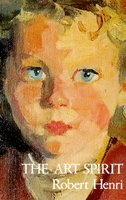
My teenage daughter Rebecca, an aspiring artist, found a book in the shelves on a recent Barnes & Noble excursion called
The Art Spirit by Robert Henri. Henri was apparently a famous painter and painting instructor, and the book is a collection of his comments collected from his lectures and letters, published back in 1923. I looked through the book and found a number of thought-provoking observations. Here's how the book opens up:
Art when really understood is the province of every human being. It is simply a question of doing things, anything, well. It is not an outside, extra thing.
When the artist is alive in any person, whatever his kind of work may be, he becomes an inventive, searching, daring, self-expressing creature. He becomes interesting to other people. He disturbs, upsets, enlightens, and he opens ways for a better understanding. Where those who are not artists are trying to close the book, he opens it, shows there are still more pages possible.
The world would stagnate without him, and the world would be beautiful with him; for he is interesting to himself and he is interesting to others. He does not have to be a painter or sculptor to be an artist. He can work in any medium. He simply has to find the gain in the work itself, not outside it.
Museums of art will not make a country an art country. But where there is the art spirit there will be precious works to fill museums. Better still, there will be the happiness that is in the making. Art tends towards balance, order, judgment of relative values, the laws of growth, the economy of living -- very good things for anyone to be interested in.
Here's another passage that leaped out at me:
There are moments in our lives, there are moments in a day, when we seem to see beyond the usual -- become clairvoyant. We reach then into reality. Such are the moments of our greatest happiness. Such are the moments of our greatest wisdom.
It is in the nature of all people to have these experiences; but in our time and under the conditions of our lives, it is only a rare few who are able to continue in the experience and find expression for it.
At such times there is a song going on within us, a song to which we listen. It fills us with surprise. We marvel at it. We would continue to hear it. But few are capable of holding themselves in the state of listening to their own song. Intellectuality steps in and as the song within us is of the utmost sensitiveness, it retires in the presence of the cold, material intellect. It is aristocratic and will not associate itself with the commonplace -- and we fall back and become our ordinary selves. Yet we live in the memory of these songs which in moments of intellectual inadvertence have been possible to us. They are the pinnacles of our experience and it is the desire to express these intimate sensations, this song from within, which motivates the masters of all art.
I felt a pang of knowing guilt reading this one:
The habit of digression -- lack of continued interest -- want of fixed purpose, is an almost general failing. It is too easy to drift and the habit of letting oneself drift begets drifting. The power of concentration is rare and must be sought and cultivated, and prolonged work on one subject must not be mistaken for concentration. Prolonged work on one subject may be simply prolonged digression, which is a useless effort, as it is to no end.
And here's one final thought from Robert Henri:
The true artist regards his work as a means of talking with men, of saying his say to himself and to others. It is not a question of pay. It is not a question of willing acceptance on the part of the public. If he is welcomed and paid it is very good, but whether or no he must say his say.
 My teenage daughter Rebecca, an aspiring artist, found a book in the shelves on a recent Barnes & Noble excursion called The Art Spirit by Robert Henri. Henri was apparently a famous painter and painting instructor, and the book is a collection of his comments collected from his lectures and letters, published back in 1923. I looked through the book and found a number of thought-provoking observations. Here's how the book opens up:
My teenage daughter Rebecca, an aspiring artist, found a book in the shelves on a recent Barnes & Noble excursion called The Art Spirit by Robert Henri. Henri was apparently a famous painter and painting instructor, and the book is a collection of his comments collected from his lectures and letters, published back in 1923. I looked through the book and found a number of thought-provoking observations. Here's how the book opens up:
No comments:
Post a Comment